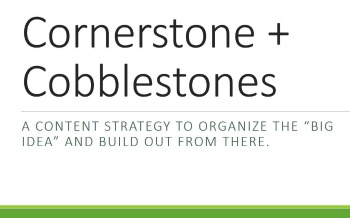My friend Angelo probably doesn’t know it, but he helped me find my online voice.
We were standing on a line to get our photos taken at an AdWeekDC event shortly after the 2008 election. Panelists from LinkedIn, Facebook, and MySpace had just finished talking about social networking and the intersection of social media and politics. Our conversation turned to Twitter and how we had no idea what anyone might tweet about. Lunch? That’s when Angelo jokingly suggested I could tweet about baseball.
The light bulb went on. I was on Twitter within days.
I didn’t start with Twitter. I started with a strategy.
I had a plan that started with my business column, which provided a direction and some early (re-purposed) content for my blog. This blog, in turn, gave me some original content for my Twitter feed–plus something useful to point to in my Twitter bio instead of a “corporate” Web site. But I still needed a voice.
It’s not about baseball. Or beer. Or business.
Here are four tips for finding your online voice:
1. Talk about what you love. I talk about the Washington Nationals, and Guinness, and distance running. Guess what? I know which colleagues love baseball and who loves to run. This helps to build the connection because the conversations are organic and not forced.
2. Mix pleasure with business. No one likes the guy (or gal) who always leads with an elevator pitch. The more you can lead with “you” and be interested and interesting, the more people will be receptive to what you have to say. Yes, you can post links to your materials, but make sure you’re also posting interesting stuff (both business and fun) that points in other directions.
3. Avoid controversy (unless controversy is your business). My general rule is to avoid politics and religion, because neither is central to what I do for a living. Plus, both topics tend to be dividing lines. I’d rather my clients select me (and me them) based on business compatibility and not external factors.
4. Strike up a conversation. Social channels are, well, social. So forget the “screen” barrier and think about how you would talk if the person were standing next to you.
Online conversations are about finding common ground, sharing, learning, and building relationships. Same as offline. Once that light bulb went on for me, I never looked back.
How did you find your online voice? What advice would you add for people and businesses just starting this journey?
Photo by muohace_dc (Flickr).



